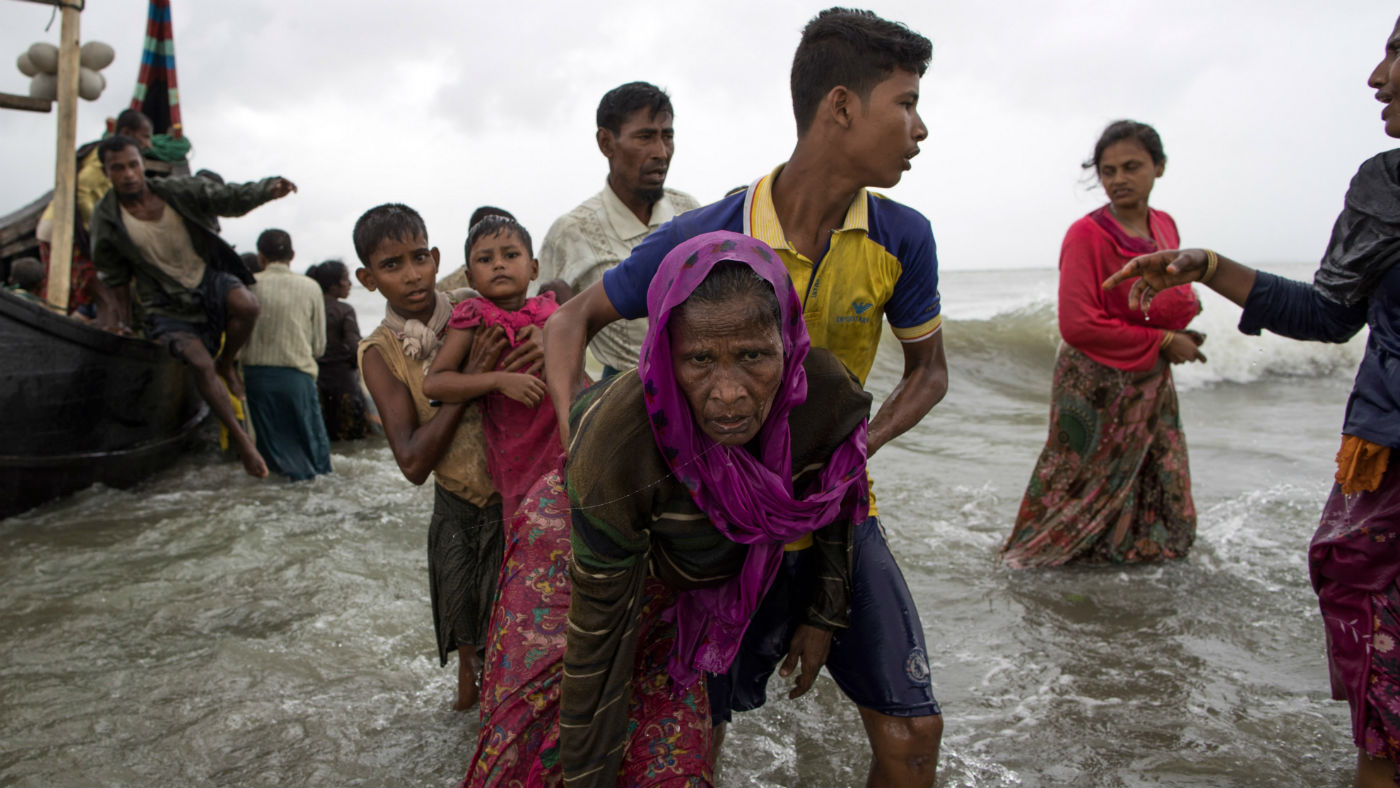Myanmar army’s ‘chilling’ fake history of Rohingya people
New book mislabels images from Rwanda genocide and Bangladesh violence to smear Muslim minority

A free daily email with the biggest news stories of the day – and the best features from TheWeek.com
You are now subscribed
Your newsletter sign-up was successful
The Myanmar military has published an “official” account of the Rohingya crisis that contains mislabelled photos falsely purporting to show the Muslim minority attacking civilians and streaming into the country as illegal immigrants.
At least 10,000 Rohingya have died and more than 700,000 fled to neighbouring Bangladesh in the past year, amid horrifying tales of slaughter, torture, rape and destruction carried out by the Burmese army.
Throughout the crisis, the Myanmar authorities have maintained that the operations are targeted at armed insurgents and that reports of atrocities against civilians are inventions or exaggerations by the Rohingya, whom they refer to as “Bengalis” and view as unwanted immigrants.
The Week
Escape your echo chamber. Get the facts behind the news, plus analysis from multiple perspectives.

Sign up for The Week's Free Newsletters
From our morning news briefing to a weekly Good News Newsletter, get the best of The Week delivered directly to your inbox.
From our morning news briefing to a weekly Good News Newsletter, get the best of The Week delivered directly to your inbox.
To reinforce this narrative, the army’s public relations bureau last month released a 117-page book about the Rohingya people’s alleged history and the present crisis.
The account, replete with doctored images and false captions, represents a “chilling rewriting of history in what appears to be an attempt to justify the killing of thousands of Rohingya”, says The Guardian.
One black-and-white photo purports to show Rohingya immigrants streaming into Myanmar following the end of British colonial rule, in 1948. The caption describes how the Bengalis “intruded” into the country.
However, using Google’s reverse image search tool, Reuters reporters were able to ascertain that the photo was taken in 1996 and actually depicts Hutu refugees in Tanzania during the Rwandan genocide.
A free daily email with the biggest news stories of the day – and the best features from TheWeek.com
A second “historical” image of Bengali migration is, in fact, a photo of the Myanmar navy seizing a migrant vessel in 2015, “flipped and converted to black and white”, says Reuters.
In both instances, the images appear to have been made blurred and grainy in order to look authentically dated and disguise their true provenance, adds The Guardian.
Another photo apparently shows Rohingyas carrying out atrocities against Burmese civilians. A man is pictured standing on a shore next to several dead bodies, and the caption reads: “Bengalis killed local ethnics brutally.”
Ironically, the photo actually depicts a Bengali man retrieving the corpses of fellow Bengalis killed by the Pakistani Army during violence in Bangladesh in the 1970s.
Earlier this week, a UN report declared the persecution of the Rohingya in Myanmar to be “genocide” - the first time the organisation has used the term in reference to the crisis - and called for Burmese army commanders to face trial for war crimes.
-
 Political cartoons for February 22
Political cartoons for February 22Cartoons Sunday’s political cartoons include Black history month, bloodsuckers, and more
-
 The mystery of flight MH370
The mystery of flight MH370The Explainer In 2014, the passenger plane vanished without trace. Twelve years on, a new operation is under way to find the wreckage of the doomed airliner
-
 5 royally funny cartoons about the former prince Andrew’s arrest
5 royally funny cartoons about the former prince Andrew’s arrestCartoons Artists take on falling from grace, kingly manners, and more
-
 The Week Unwrapped: Synthetic fuel, Myanmar and an energy rebate
The Week Unwrapped: Synthetic fuel, Myanmar and an energy rebatepodcast Could fuels made from CO2 and hydrogen end our dependence on oil? What’s happening in Myanmar? And will energy companies pay us to use less power?
-
 Home Office worker accused of spiking mistress’s drink with abortion drug
Home Office worker accused of spiking mistress’s drink with abortion drugSpeed Read Darren Burke had failed to convince his girlfriend to terminate pregnancy
-
 In hock to Moscow: exploring Germany’s woeful energy policy
In hock to Moscow: exploring Germany’s woeful energy policySpeed Read Don’t expect Berlin to wean itself off Russian gas any time soon
-
 Were Covid restrictions dropped too soon?
Were Covid restrictions dropped too soon?Speed Read ‘Living with Covid’ is already proving problematic – just look at the travel chaos this week
-
 Inclusive Britain: a new strategy for tackling racism in the UK
Inclusive Britain: a new strategy for tackling racism in the UKSpeed Read Government has revealed action plan setting out 74 steps that ministers will take
-
 Sandy Hook families vs. Remington: a small victory over the gunmakers
Sandy Hook families vs. Remington: a small victory over the gunmakersSpeed Read Last week the families settled a lawsuit for $73m against the manufacturer
-
 Farmers vs. walkers: the battle over ‘Britain’s green and pleasant land’
Farmers vs. walkers: the battle over ‘Britain’s green and pleasant land’Speed Read Updated Countryside Code tells farmers: ‘be nice, say hello, share the space’
-
 Motherhood: why are we putting it off?
Motherhood: why are we putting it off?Speed Read Stats show around 50% of women in England and Wales now don’t have children by 30